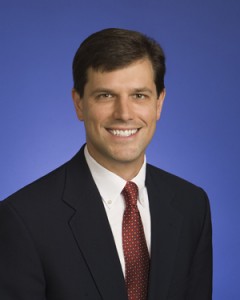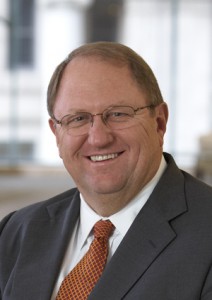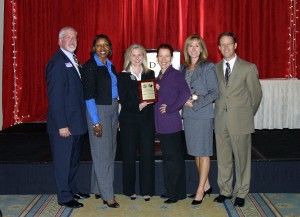By Mark Curriden, Senior Legal Affairs Writer
mark.curriden@texaslawbook.net
Marc Vockell used to struggle to get fellow associates and partners to help with pro bono. They were too busy with paying clients. The specific project wasn’t interesting. Some lawyers simply didn’t want to do it.

Vockell still calls lawyers for assistance on pro bono, but he gets a much different response.
“Today, I get very few rejections and most lawyers I call seem very eager to volunteer,” says Vockell, who left a law firm to go in-house at Dell Inc., where he is now the director of litigation. He has significant input into deciding which law firms are hired to represent the computer giant.
“Not only has Dell stepped up our pro bono efforts, we expect the law firms we hire to do so,” he says. “Dell expects all of its vendors to be socially responsible. For law firms, that means pro bono.”
For decades, in-house corporate legal departments avoided pro bono. Most general counsels had no formal pro bono programs and many discouraged their staff from getting involved in legal matters not directly related to the business.
That attitude changed dramatically during the past few years. Most corporate legal departments established in-house pro bono committees. Some reward or even require pro bono work of their staff attorneys. A growing number of general counsels even take the pro bono efforts of outside law firms into account during the hiring process.
In fact, leaders in legal services for the poor say that corporate legal departments went from being a non-factor only five years ago to being a driving force today. And many general counsels are using their positions to pressure the outside lawyers who work for them to do more pro bono.
“General counsels are doing a better job of making it clear that we encourage pro bono,” says AT&T General Counsel Wayne Watts of Dallas. “It is important that our lawyers at AT&T do pro bono and it is important that the law firms who work for us be committed to pro bono. “

Watts has established a committee of 18 AT&T lawyers to search for additional pro bono opportunities for his team. His attorneys regularly staff the small business clinic and the criminal law clinic at SMU Dedman Law School.
Several AT&T’s pro bono projects are joint efforts with their outside counsel. Many general counsels, including Watts, say that offering to work on a pro bono project with their in-house lawyers is a smart way to get in the door and in the hour for paid legal work.
“If I attended every dinner and every reception that law firms invited me to, I would weigh 500 pounds and never spend a night at home,” says Watts. “But if a law firm approached me or a member of my team about a specific pro bono project, we will give it serious consideration. And we get to see that lawyer in action.”
Watts says he and his lawyers understand the law firms’ motivation is “face time with our lawyers in order to develop relationships with a potential client.” But he says that is perfectly legitimate and it is a creative way to nurture such a relationship, while also providing legal services to those who need it but cannot afford it.
ExxonMobil Senior Counsel Susan Sanchez says the energy company’s legal department has hired outside law firms after lawyers for those firms participated in joint pro bono projects.
“Law firms need to know that there’s a lot of good work that can come from this relationship,” says Sanchez, who handles labor, employment and torts litigation at the Irving-based company.
“Social invitations from law firms have become so frequent that they are burdensome,” she says. “Volunteering to do pro bono work with us is much more attractive than an invitation to a reception or another spa day.”
Pro bono advocates say that former ExxonMobil General Counsel Charles Matthews and former Shell Oil General Counsel Cathy Lamboley were early supporters of in-house pro bono efforts.

Then, in 2005, American Airlines General Counsel Gary Kennedy became one of the first GC’s in the country to implement a formal program that encouraged and facilitated pro bono for its 40 in-house lawyers. Two years ago, American took the unprecedented step of requiring all of its lawyers to do a minimum of 10 hours of pro bono annually.
“Making it mandatory was a way of getting everyone to try it,” says AA senior attorney Marjorie Powell, who is the department’s pro bono coordinator. “We felt some of our lawyers might have cold feet doing work outside their comfort zone and we needed to give them that extra push.”
At the same time, American started encouraging its outside lawyers to join it in various pro bono efforts. The AA legal department teamed with lawyers from Haynes and Boone to assist dozens of military veterans and people seeking asylum. The company’s lawyers also joined with Hunton & Williams to conduct a “Wills for Seniors” clinic in 2010 and 2011.
“We knew if we could get other corporate legal departments involved, we would get more outside lawyers to participate,” says Powell.
In 2010 and 2011, AA’s pro bono program became the buzz of corporate legal departments across the country. Kennedy and Powell trumpeted the program at corporate counsel forums and legal retreats. Last August, AA invited 40 in-house lawyers from businesses across Texas to join it at a CLE training clinic, which was sponsored by Haynes and Boone.
One of the companies that attended the clinic was ExxonMobil. The Irving-based energy company has been very aggressive in calling upon its outside firms to join it in pro bono efforts.
![]() For example, ExxonMobil is teaming with Fulbright & Jaworski to act as corporate counsel for Avenue CDC, a non-profit community development project in Houston. It partnered with Gardere Wynne Sewell to be corporate counsel for Agape Development Ministries, which serves low-income residents of Houston’s Third Ward with life skills training and job placement.
For example, ExxonMobil is teaming with Fulbright & Jaworski to act as corporate counsel for Avenue CDC, a non-profit community development project in Houston. It partnered with Gardere Wynne Sewell to be corporate counsel for Agape Development Ministries, which serves low-income residents of Houston’s Third Ward with life skills training and job placement.
And ExxonMobil joined with Bracewell & Giuliani to act as corporate counsel for Casa de Esperanza, which provides residential, medical and psychological care to children in crisis. ExxonMobil lawyers handle everything from drafting employment manuals to reviewing contracts.
“We want to work on projects to help the elderly, families and children,” says Sanchez, who heads pro bono efforts for the corporate legal department.
“We contacted Bracewell about Casa de Esperanza because the firm had a lawyer who served on Casa’s board,” says Sanchez. “We didn’t do much legal work with Bracewell, but this pro bono project has opened that door.”
Sanchez says ExxonMobil looks for pro bono projects that are good fits and then “looks to partner with law firms that offer expertise that ExxonMobil doesn’t have.” She says she is talking with lawyers at Weil, Gotshal & Manges about working together. The corporate legal department is interested in tackling new pro bono projects that target human trafficking and protect animal rights, she says.
Several in-house legal departments, including Marathon Oil, Halliburton and Shell Oil, are active in the Houston Volunteer Lawyer Program.
Marathon lawyers have worked with Baker Botts on several HVLP clinics helping the elderly prepare wills and immigrants on asylum matters.
“We need our outside counsel to buy into our mission. It is a character issue,” says Marathon senior litigation counsel Karen Lukin. “We expect the lawyers who work for us to give back to the community.
“If we have two law firms pitching for our business, and one of them is all about money but does little to no pro bono and the other firm shows us how much they give back, then that’s the law firm we want representing us,” says Lukin.
 Halliburton’s corporate legal department has worked with Baker Botts, Haynes and Boone and Weil Gotshal & Manges on a handful of legal clinics that advised pro bono clients on everything from bankruptcy and family law to immigration and landlord-tenant issues.
Halliburton’s corporate legal department has worked with Baker Botts, Haynes and Boone and Weil Gotshal & Manges on a handful of legal clinics that advised pro bono clients on everything from bankruptcy and family law to immigration and landlord-tenant issues.
Ivett Hughes, who is senior counsel at Halliburton, says she issues a regular report to her colleagues listing the names of the lawyers and firms that have assisted Halliburton on pro bono matters.
“We definitely pay attention to it,” says Hughes.
Corporate counsel are starting to understand that there are great networking opportunities in doing pro bono with outside firms, says Vockell. He says Dell regularly does pro bono work with Graves Doughtery and Vinson & Elkins in Austin, but they are open to any offers.
Vockell and V&E recently represented a woman who had experienced foundation problems with her house. Her insurance company paid for her to stay at a long-term stay hotel for a few weeks while her house was being repaired. The hotel said it would direct bill the insurance company.
But the hotel didn’t inform the woman when the insurance coverage ended. Instead, it presented her with a large bill at the end, which she couldn’t afford. The hotel sued in state court.
“Lawyers for the hotel chain thought they could use the defendant’s lack of knowledge and sophistication to obtain a fast and uncontested judgment,” says Vockell. “They were very surprised when she appeared in court with lawyers from Dell and V&E representing her.”
The hotel chain quickly agreed to settle the case favorably for the defendant.
 Shell Oil Senior Counsel James Cowan, who heads the energy firm’s 20 lawyer pro bono committee, said the key to success is finding projects that interest their lawyers. He points to Shell’s partnership with Sutherland Asbill & Brennan to act as corporate counsel for Multicultural Education and Counseling through the Arts, a Houston non-profit.
Shell Oil Senior Counsel James Cowan, who heads the energy firm’s 20 lawyer pro bono committee, said the key to success is finding projects that interest their lawyers. He points to Shell’s partnership with Sutherland Asbill & Brennan to act as corporate counsel for Multicultural Education and Counseling through the Arts, a Houston non-profit.
“I’m not sure most corporate legal departments realize how much influence they have on outside law firms,” says Cowan. “We have a tremendous opportunity to do good.”

Leave a Reply
You must be logged in to post a comment.